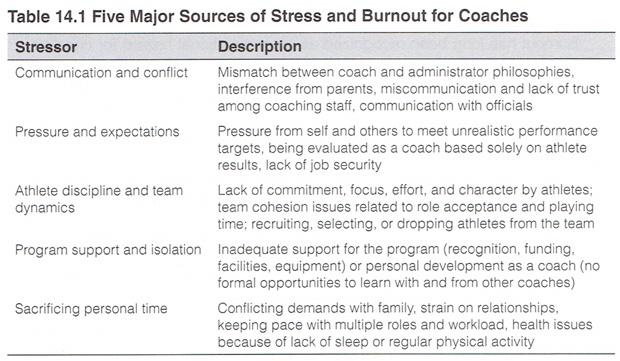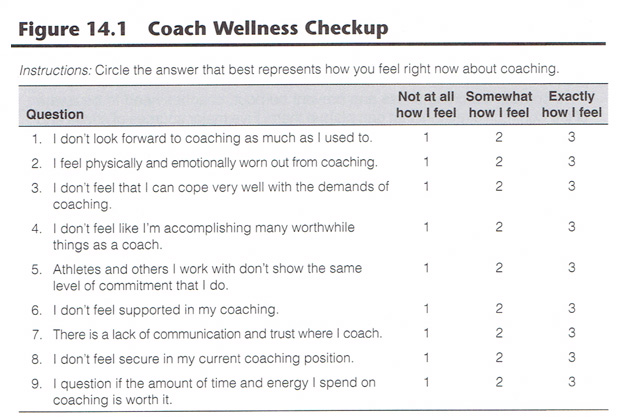| Watching for and Avoiding Burnout |
| By: Wade Gilbert
Originally Published in: Coaching Better Every Season Provided by: Human Kinetics Add to this the prevailing win-now goal of many administrators and program stakeholders and low or nonexistent job security for most coaching positions and you have a perfect recipe for potential burnout. People have said that there are three kinds of coaches today - those who resign before they get fired, those who have been fired, and those who will be fired. Burnout has long been recognized as an occupational hazard for coaches. Burnout is generally defined as withdrawal from an activity because of physical and emotional exhaustion.' Famous coaches from Ara Parseghian, who led Notre Dame to national championships in 1966 and 1973, to more recent championship coaches such as Steve Spurrier, who resigned midseason in 2015, have had their careers cut short because of emotional fatigue and frustration. Surely, an untold number of lesser-known coaches, at every level of sport, have left coaching prematurely because of stress and burnout. Signs of burnout include loss of interest, depression, and increased anxiety. Coaches experience burnout when they become unable to cope with the stress of coaching. Coaches by nature are competitive people who strive to win. But the constant pressure, both self-induced and brought by others who follow the coach, will lead to burnout and serious health issues for coaches who don't learn how to cope effectively with the stresses of coaching. A coach who does not cope well with stress has a negative effect on her or his athletes. When a coach shows up with low energy or depressed, athletes notice. Their ability to learn and perform declines, and team culture diminishes. For example, high school and college athletes who play for coaches who suffer from emotional exhaustion have higher levels of anxiety and burnout than athletes who play for spirited coaches. Moreover, because they are not able to give 100 percent to their coaching, emotionally exhausted coaches are perceived by their athletes to be less effective teachers and to give less praise. To combat coaching stress and prevent burnout, coaches need to be aware of the common stressors that can plague them. Five major sources of stress and burnout can affect coaches: (1) communication and conflict, (2) pressure and expectations, (3) athlete discipline and team dynamics, (4) program support and isolation, and (5) sacrificing personal time. A description of each stressor is provided in table 14.1. The off-season is the ideal time for coaches to pause and reflect on how well they are handling these common sources of stress and burnout. Coaches should take a few minutes at the start of the off-season to complete a coaching wellness checkup (see figure 14.1). Questions listed in the wellness checkup are based on tools that have been tested through extensive research with coaches and athletes. The higher the score is on the wellness checkup, the greater the risk is that a coach will succumb to stress and burnout. By honestly answering these nine simple questions, you can select the right off-season coach wellness activities to ensure that you return to the next season energized and ready to lead your athletes. Your motivation and confidence as a coach is strongly linked to how well you handle coaching stress. Coaches who believe that they are meant to coach and who coach because they love having the opportunity to lead and develop athletes are said to be intrinsically motived. Coaches with high intrinsic motivation and confidence in their ability as coaches are more resilient.
Resilient coaches have what is known as a hardy personality. Coaches who demonstrate hardiness are more committed to their work, feel confident and in control, and view unexpected setbacks as challenges rather than threats. When coaches succumb to stress, their passion for coaching drains away and their hardiness weakens. Although coaches need strategies for recharging and coping with stress at all times throughout the year, the off-season presents a unique time for coaches to recover and recharge. For example, coaches can replenish their motivation for coaching by attending clinics, watching videos, or reading books. In the remainder of this chapter the focus is on sharing proven strategies for recharging in the off-season that will help coaches develop the hardiness needed to handle common sources of stress and burnout. |









